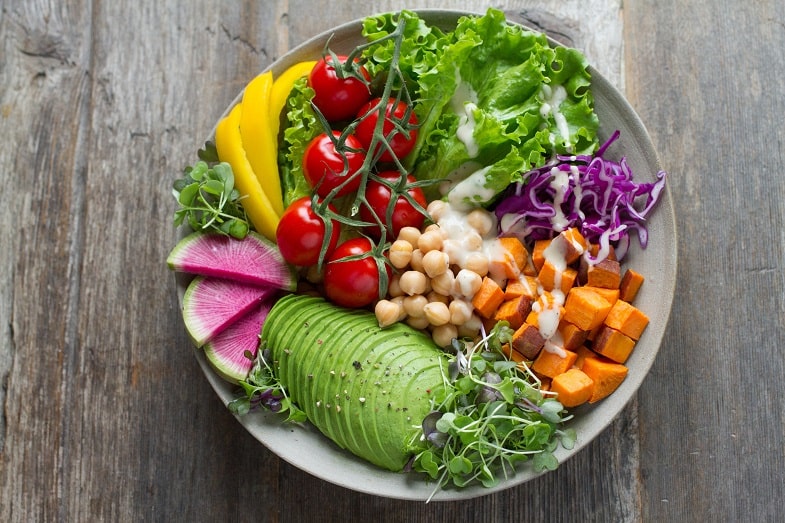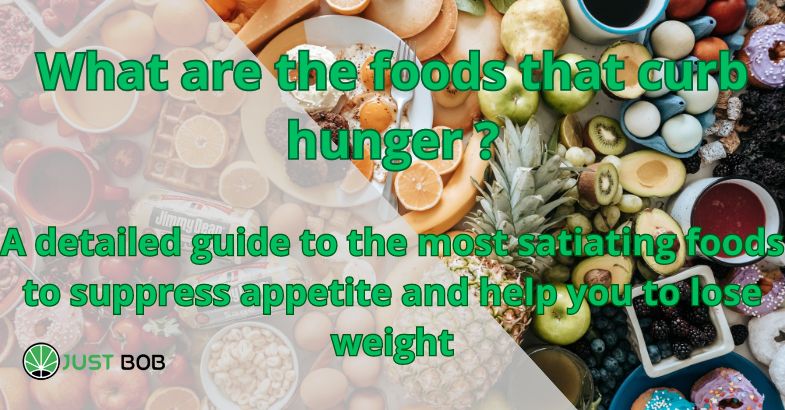Modified on: 06/03/2024
A detailed guide to the most satiating foods to suppress appetite and help you to lose weight
Hunger is a physiological sensation related to the need for nutrients and energy that the human body signals to the mind. Satisfying hunger is essential for overall well-being and health. However, not all foods are equal when it comes to effectively and healthily satisfying hunger. In fact, many can temporarily appease you but fail to provide a feeling of fullness for many hours. We know that others are classified as “hunger-satisfying foods.”
The hunger hormone, ghrelin, sends signals to the brain when it’s time to eat and can influence our eating habits.
This is because not all foods are created equal, and some help you lose weight even while eating a lot, preventing that stomach rumbling that would make you eat a 200-gram plate of pasta even at 11 in the morning!
It’s important to never skip main meals and to opt for certain foods that could be helpful in regulating sugar levels or for simple hunger attacks, thus avoiding unhealthy snacks due to sudden hunger.
In any case, being able to control your appetite allows you to resist the temptations of good food, and knowing what to eat helps you become more aware of your body. Here, according to our research, are the foods that satisfy hunger.
However, it’s important to remember that factors like stomach volume and the quantity and quality of gastric juices can influence the sense of fullness.
In this article, we, at Justbob, explore a series of foods that crub hunger, backed by scientific and nutritional studies to provide evidence-based information.
Always remember, though, that it’s essential to choose the right foods based on the season.
How to reduce food intake for your dietary strategies and appetite control
When it comes to weight loss, understanding how to suppress appetite and control food cravings is essential. Eating foods that promote weight loss can make a significant difference in your journey to shed those extra pounds.
One key strategy is to include high-fiber foods in your diet. High-fiber foods help with suppressing appetite and promoting feelings of fullness. They also stabilize blood sugar levels, reducing the blood sugar response to the next meal, which aids in appetite control.
Natural appetite suppressants, such as high-fiber diets, can be particularly effective in managing hunger hormone levels. Foods rich in soluble fiber, like fruits, vegetables, and legumes, can help reduce food intake and curb appetite.
Protein-rich foods, especially lean meats and Greek yogurt, are another valuable asset in weight loss. They can decrease feelings of hunger andenhance the sensation of satiety due to their influence on fullness hormones. Additionally, low-fat protein can boost metabolism, helping to burn fat and manage body weight.
Spicy foods can also play a role in decreasing hunger. They can suppress your appetite and reduce food cravings, making it easier to adhere to a healthy diet and aiding in weight management.
In contrast, high-calorie should be limited in your diet. Reducing the consumption of these foods can lead to a lower energy intake and ultimately help with appetite regulation.
Mindful eating is another helpful approach. Paying attention to how much food you consume and how it makes you feel can prevent overeating and binge eating. Eating chunky pureed vegetable soup or other heart-good fats can contribute to appetite reduction and overall weight loss.
Dietary supplements can be part of your weight management strategy, but it’s crucial to choose those that have other health benefits and can increase feelings of fullness.
In conclusion, a combination of high-fiber foods, lean protein, and natural appetite suppressants can assist in your weight loss journey. Coupled with mindful eating and the reduction of high-calorie and high-fat foods, you’ll be on your way to achieving your weight loss goals and improving your overall health.


Managing Food Cravings for Weight Loss and Appetite Control
Do you often find yourself giving in to food craving? It’s a common challenge when trying to shed body weight and adopt healthier eating habits. The good news is that there are various strategies and foods that can help you resist the temptation of high-calorie, unhealthy choices.
One effective approach is to consume fewer calories in your daily meals. By reducing your calorie intake, you can gradually lower your body weight and make it easier to control your appetite during your next meal. This approach can also contribute to a decrease in body fat, aiding in your weight loss journey.
Appetite suppressants, whether they’re natural appetite inhibitors or dietary supplements, can be a valuable tool. They help in suppressing appetite hormones, making it easier to resist the pull of other foods that may lead to food craving.
For those who prefer solid foods, consider incorporating high-fiber options into your diet. These foods provide stable blood sugar levels, which can help suppress your appetite. You can even indulge in a bit of dark chocolate (preferably milk chocolate with a higher cocoa content) to satisfy your sweet tooth while still managing your cravings. Furthermore, one particular study found that people who ate dark chocolate before a meal instead of milk chocolate ate less of the meal on average.
Protein-rich foods like lean meats and Greek yogurt are known to increase feelings of fullness and help curb appetite. This makes them an essential part of a balanced diet that aids in weight loss.
In addition to your diet, maintaining a high-fat diet and prolonged exercise can further decrease food consumption and decrease feelings of hunger. Overweight women, in particular, may find these strategies to be especially beneficial.
When it comes to meal choices, consider including chunky vegetable soup as it can help decrease food consumption and curb your appetite. This is especially helpful for those who experience binge eating episodes or find themselves feeling hungry frequently.
In conclusion, managing food craving and controlling your appetite is crucial for successful weight loss. By adopting these strategies and incorporating appetite inhibitors, high-fiber foods, and protein-rich options into your diet, you can significantly improve your journey towards a healthier lifestyle.
Read also: Alternatives to Tobacco for Quitting Smoking
Proteins
A study published in the “American Journal of Clinical Nutrition” showed that diets rich in proteins contribute to an overall reduction in calorie and in food intake . Lean proteins were particularly effective in this context.
For example, lean proteins like chicken, turkey, fish, and tofu are known for their ability to satiate hunger and prevent cravings. These foods are rich in amino acids that help regulate appetite.
Furthermore, a protein-based meal is more satisfying than carbohydrates, but it’s important to remember not to overdo protein intake since, like any excess, it could have risks and repercussions on your body.
The Power of Green Tea
Green tea has long been known for its multiple health benefits. One of its most interesting properties is its ability to reduce the sense of hunger. Thanks to its vitamins, antioxidants, and caffeine content, green tea can help control cravings. A cup of green tea during the day can be an excellent ally in appetite management.
Popcorn
Contrary to popular belief, popcorn (made from corn kernels) is a healthy and dietary snack. With 25 grams of corn, you get over 100 grams of popcorn, providing less than 90 calories. Of course, it’s preferable to make them at home, using a non-stick pan and avoiding butter and oil. A pinch of salt, and the hunger pangs will disappear!
A study from the University of Scranton has shown that popcorn contains the same antioxidant polyphenols found in fruits and vegetables, which are considered a valuable aid in preventing heart and chronic diseases, as well as certain types of cancer.
An article published in the journal “Nutrition Reviews” highlighted that an increased intake of dietary fiber is associated with a reduction in appetite. Fiber also helps regulate sugar levels, avoiding spikes and crashes that can lead to sudden hunger and a feeling of emptiness.
Foods Rich in Water
Water content is one of the most important parameters in determining the satiating power of a food. During cooking, a food can absorb or lose water.
High-water-content foods, found in nature, such as cucumbers, celery, tomatoes, and melons, can effectively help satisfy hunger, helping you control your weight, fighting off hunger for hours, and nervous cravings. Another important element is that the water in these foods adds volume to the meal without adding many calories.
Healthy Fats
Good fats, such as those found in avocados, nuts, and olive oil, can be an excellent source of energy, combating cravings and aiding in weight loss. These fats are digested slowly, helping maintain stable sugar levels in the body and reducing the sensation of hunger.
Avocado is a fruit rich in fiber and monounsaturated fats considered heart-healthy. It’s believed to reduce appetite when consumed in moderation. In fact, it’s the beneficial fats it contains that are effective in sending signals to the brain indicating that our stomach is full and there’s no need to eat more.
Chili Peppers and Seeds
Chili pepper is known for its ability to increase metabolism and reduce hunger. Incorporating chili pepper into your dishes can help you feel satiated after a meal. Similarly, seeds like chia and flax seeds are rich in fiber, omega-3, and protein, which contribute to keeping hunger at bay for longer. Sunflower seeds curb sweet cravings. Sunflower seeds contain up to 55% good fats, which promote a good balance for the body!
Plant Proteins
Plant proteins, such as those found in legumes, soy, and whole grains, can be highly satisfying and often help control weight. They are often an excellent choice for vegetarians and vegans looking to satisfy their appetite.
A meal rich in plant proteins satisfies hunger, fights weight gain, regulates hunger hormones, slows carbohydrate absorption, and provides essential amino acids. Integrating a variety of plant protein sources into your diet can be an effective strategy for reduce appetite and maintaining a balanced diet.
Read also: Can you smoke chamomile?
Citrus Fruits
Citrus fruits fill the stomach and burn calories; oranges, lemons, grapefruits, mandarins, and generally all citrus fruits are effective for decrease food consumption . In addition to providing high doses of vitamin C, useful in preventing inflammation that blocks metabolism, citrus fruits possess antioxidant and anti-inflammatory properties, which translate into potential benefits in the prevention and treatment of heart diseases, vascular diseases (atherosclerosis, thrombosis, thrombophlebitis), hyperlipidemia, and diabetes.
Yogurt and Dairy Products
Yogurt and other low-fat dairy products, such as low-fat cheese, are often used to control hunger and provide proper balance to the human body. They are rich in protein and can contribute to a greater sense of fullness, fighting the indiscriminate urge to dive into various calories.
Eggs
Eggs are an excellent source of protein and also contain good fats. They also have a low glycemic index, meaning they have a lesser impact on blood sugar. Consuming low glycemic foods can help prevent sudden sugar spikes and crashes, which often lead to hunger pangs shortly after eating and, above all, help fight the desire to eat something sweet.
As mentioned before, eggs are one of the densest sources of animal proteins. Each egg contains about 6-7 grams of complete proteins, providing all the essential amino acids needed for the human body.
Beware of Sugars and Carbonated Beverages
If you’re on a diet, you know it well; a sudden hunger attack can strike at any moment, and resisting it can be really challenging. But you must make an effort, otherwise, you risk nullifying the sacrifices you’ve made. On the other hand, it’s important to avoid excessive consumption of refined sugars and carbonated beverages, which can cause spikes and drops in blood sugar levels and lead to more hunger attacks.


Foods Rich in Proteins and Fiber
Some foods, like legumes and whole grains, can be a perfect combination of proteins and fiber, providing lasting satiety.
Nuts, almonds, hazelnuts, and other nuts contain healthy fats, proteins, and fiber, making them a satisfying option that combats the craving for fatty foods.
Cannabis and Appetite : What Happens with Weed ?
Cannabis (or other products derived from it, such as hashish or crystals) can influence appetite in different ways depending on various factors, including the type of cannabis used, dosage, frequency of use, and individual reaction. In general, cannabis is often associated with an increase in appetite, a known effect called “munchies” or more colloquially referred to as “chemical hunger.” This phenomenon is often described as a sudden and intense desire for food, often high in calories and unhealthy.
The appetite-stimulating effects of cannabis have been used in medicine to treat conditions such as anorexia or chemotherapy-induced nausea. However, increased appetite may not be desirable for everyone trying to reduce calorie intake, especially if they have other medical conditions.
It’s important to note that regular and heavy cannabis use can lead to tolerance, meaning that over time, the effect on appetite may diminish. Furthermore, some strains of cannabis, especially those high in THC, can have a more pronounced effect on appetite compared to, for example, legal hemp, which has other effects.
On the other hand, some people report that cannabis use can reduce appetite or cause disinterest in food, although this effect seems to be less common than increased appetite.
In summary, the effects of cannabis on appetite can vary widely from person to person and depend on many factors. The use of cannabis for medical or recreational purposes should be discussed with a healthcare professional and done responsibly, taking into account potential side effects.
If you want to know more about “chemical hunger,” read this article !
Conclusion
Satisfying hunger in a healthy and effective way through foods rich in lean proteins, fiber, water, and healthy fats is essential for the body and for a proper diet. However, satiety is also influenced by psychological and behavioral aspects, such as eating slowly and listening to the body’s hunger and satiety signals. It’s recommended to consult a healthcare professional for a personalized meal plan.
In any case, if you’re interested in this and other topics, you can access our blog to find a wealth of information about CBD flower (products derived from it like CBD oil, hashish, etc.) and related topics.
Happy reading!









